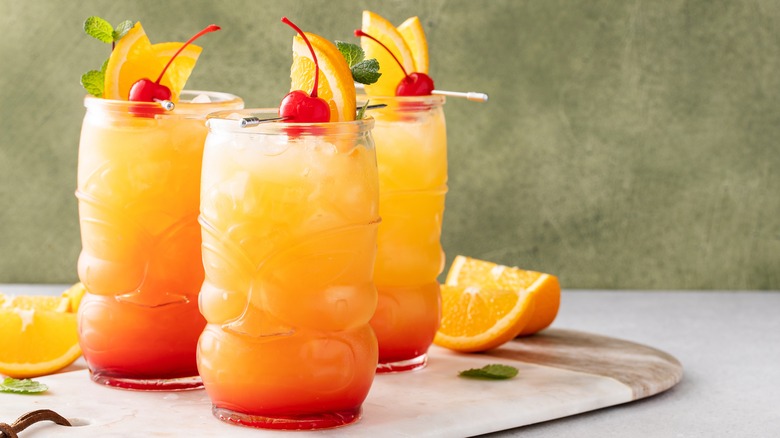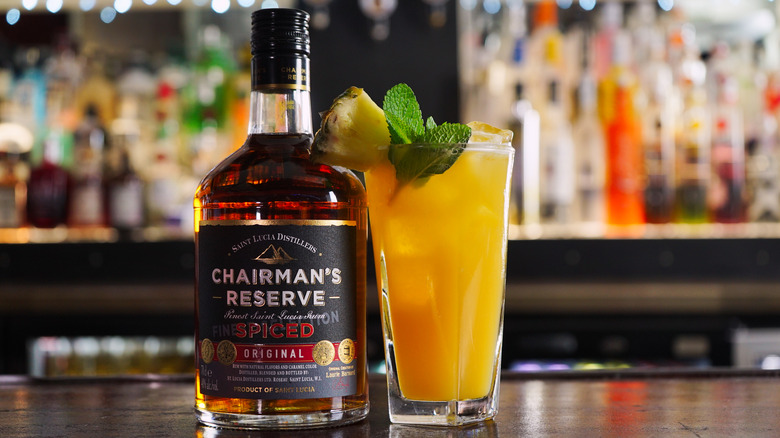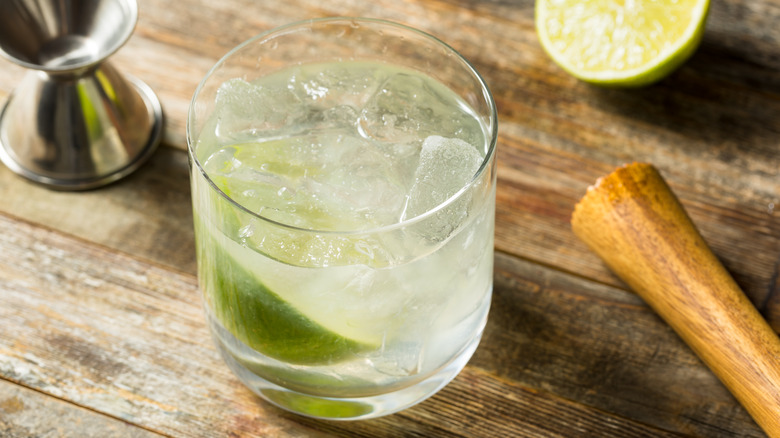The Difference Between Planter's Rum Punch And Ti' Punch
There are a lot of things to recommend in the Caribbean. With beautiful landscapes, gorgeous beaches, and wonderful food, it's a great place to spend a vacation. But while you're relaxing on the beach with a plate of festival, there's no better accompaniment than a tropical mixed drink. And while you can get these in any type of alcohol, none feel more appropriate to the situation than drinks made with rum. Though it was (probably) originally created in Brazil when Portuguese colonizers brought sugarcane to South America, rum production quickly spread to the Caribbean, and in the centuries since, it's become a huge part of island culture.
But there isn't just one type of rum drink from the Caribbean out there. Heck, there isn't even one type of rum punch (a mixture of rum and various fruits that make a harmonious tropical mixture). Two varieties of rum punch deserve consideration here: Planter's Punch and Ti' Punch. But what's the difference between the two? A lot, it turns out: In addition to their differing countries of origin (Planter's Punch comes from Jamaica, while Ti' Punch is from French former colonies on Martinique and Guadalupe), they don't even have the same ingredients.
Planter's Punch can be made any number of ways
Planter's Punch has origins that are somewhat disputed. Though North American cities like Charleston, South Carolina, and St. Louis, Missouri, lay claim to Planter's Punch, most food historians agree that the drink came from Jamaica, where it's still a huge part of the island's culture. Its specific origin story is murky: It most likely originated in the late 1800s, possibly made using Myers's rum, which developed a dark variety distilled from Jamaican molasses specifically for the cocktail named Planter's Rum.
The thing about Planter's Punch is that there isn't just one recipe. It gets tailored to an individual's taste — though there are some commonalities. The most important is the rum itself: Almost always dark and typically overproof (meaning more than 50% alcohol by volume, a potent amount). It always involves some type of citrus fruit — but that can mean lime juice, orange juice, grapefruit juice, or whatever other citrus you want to use — then a sweet component (typically syrup), and then adds spices like (Jamaica's favorite) sorrel, nutmeg, or mint.
The Planter's Punch formula was passed through generations in a rhyme that typically goes "one of sour, two of sweet, three of strong, and four of weak ... a touch of spice to make it nice." The spice is self-explanatory here, but the other components are sour (citrus), sweet (sugar), strong (the rum itself), and weak (water or ice).
Unlike Planter's Punch, Ti' Punch is very specific
In contrast to Planter's Punch, we know exactly where Ti' Punch came from: The former French colonies of Martinique and Guadalupe. The name itself gives away the game: "ti'" is short for "petite," which means small in French. It's an important part of the culture of those islands, where it's often treated similar to espresso in Italy, something you drink as a pick-me-up during the day. That "small" in the name, meanwhile, comes from the fact that, unlike Planter's Punch, Ti' Punch is made with only three ingredients: rhum agricole, lime juice, and sugarcane syrup.
Rhum agricole is an important distinction here. Unlike dark rum, which is typically made with molasses, rhum agricole is made from fresh sugarcane juice, meaning it's usually a white rum (unless it's been aged). Unlike Planter's Punch, which follows a formula and not a recipe, Ti' Punch has a specific process: First, you add the lime juice to the glass, muddle it with sugarcane syrup, then add the rhum agricole on top of it. Whether you add ice is up to you.
Whichever variety you prefer, there's no wrong answer. Try them both and see which really makes your day.


